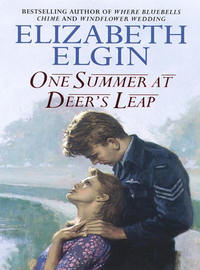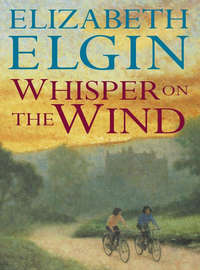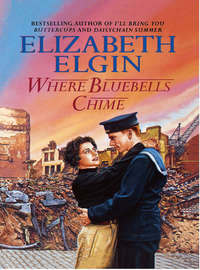
Полная версия
A Scent of Lavender
‘Reckon this place would take a bit of finding, queen. But is that it?’
‘No. There’s more. It says I must remember that fighting men must have clear roads. I do not go onto the road on a bicycle, in a car or on foot. Whether I am at home or at work, I just stay put. And it ends with, “Cut This Out and Keep It”.’ She gazed into Ness’s eyes, begging comfort. ‘It’s more serious than I thought. And look at this cartoon!’ She laid the newspaper on the table, pointing to it with a forefinger stiff with fear. ‘Look at him! It makes you want to weep, doesn’t it?’
The cartoon showed a steel-helmeted British soldier, feet apart, rifle in his right hand, left arm extended in defiance at planes flying overhead. And he was saying, ‘Very well! Alone!’
‘Ar, hey. You’re right, Lorna. We’re up the creek and no messin’. Suppose we’ve been trying to kid ourselves everything would be all right, but maybe it isn’t goin’ to be.’
‘Maybe. Ness – when your warden came this morning, she seemed to think that you being at Ladybower was only temporary, but I told her I’d like you and me to give it a try – a month, say – and she said it was OK by her. I hadn’t read the paper when I asked if you could be here permanently, but now I really, really want you to stay. I’m not very brave, you see, and if there were the two of us it might not seem so bad.’
‘Ar. That’s nice you wanting me an’ of course I’d like to stay. But hadn’t you thought, queen, it’s likely to be on the south coast – If it happens. It’s them poor beggars who’ll cop it before you an’ me will.’
‘William is in the south,’ Lorna said dully.
‘Ar, but he’s with soldiers and they’ll have rifles and hand grenades and machine guns.’
‘In the Pay Corps?’ She ran her tongue round dry lips. ‘Mind, William learned to shoot when he was in the Territorials.’
‘And he’ll be all right, same as you and me will! As for this country being alone, well, I suppose we are. But Hitler’s got to cross the channel, hasn’t he? And what’s it called, eh? The English Channel! And we got most of our soldiers back from France, don’t forget, and we’ve got a Navy, an’ all! You aren’t goin’ to tell me our Navy’s goin’ to let them Jairmans set foot on English soil without a fight, now, are you?’
‘But Ness, there’s something else. Flora Petch – y’know, the district nurse from Larkspur Cottage. Well, she told me she saw men taking down the signpost at the top of the lane; taking the arms down, that was. They told her it was so German parachutists wouldn’t know where they had landed if there were no names on signposts. And the men said that railways were doing the same. No more names on stations. Nobody’ll know where they are any more!’
‘So what? Neither will them parachutists, if they come! Ooh, I hate that Hitler, but let’s not let him spoil our supper, eh? It’s just what he wants, innit; us running round like headless chickens, so you and me won’t oblige, eh? We’ll eat our supper and then we’ll worry about being invaded.’
‘And you’ll stay, Ness? You don’t mind that I asked the warden if it could be on a permanent basis?’
“Course I don’t. And we aren’t entirely on our own, y’know. I heard it on the wireless at Glebe Farm that the first convoy of Australian and New Zealand soldiers has arrived to help us out. So bully for them, eh, and good on them coming, just when we need them.’
‘You’re right. I’d say it was pretty bloody marvellous them coming all that way to fight for a country they none of them ever thought to see. And the word invasion is banned for the rest of the day! Right?’
But for all her sudden defiance, Lorna was afraid and wished desperately that William could be with her. William would have known what to do if parachutists dropped in one of the fields around. But William was a long way away, Somewhere in Wiltshire, so there was nothing for it but to get on with it as best she could; as best she and Ness could, that was. And oh, thank the dear heaven for the land girl from Liverpool!
Ness made for the almshouses to her left, across the Green. Three of them, built more than four hundred years ago for the nuns at the priory and not considered important enough to be destroyed by Tudor vandals. Goff Leaman lived in one of them and Martha Hugwitty in another. Of the occupant of the middle one, Ness knew little, save that he was sometimes there and sometimes he wasn’t.
‘Mr Leaman?’ she asked of the man who stood in the tiny front garden who had already stuck his spade into the ground at her approach, and now regarded her with unashamed curiosity.
‘That’s me. You’ll be the land girl from Glebe?’
‘Mm. I’ve got a message from Mr Wintersgill. He said could you get your body and your shotgun up to the farm tomorrow early. Says he’s got cartridges. You’re going to be shooting rabbits, aren’t you?’
‘That’s the general idea. And before you start worrying about them fluffy little bunnies, let me tell you they’re a dratted nuisance and do a lot of damage. Vermin, that’s what. They make a grand stew, for all that. Starting the haymaking, are they?’
‘That’s right. I did hear Rowley say he’d be up good and early to open up the field, whatever that means.’
‘It means, lass, that he’ll cut a road round the field so the machinery can get in. Do it by hand, with a scythe, and by the time it’s finished, the rest of the field will have the night dew off it and be dry enough for the mower. And you’d better call me Goff. Everyone else does. Short for Godfrey.’
‘And I’m Ness,’ she smiled. ‘Short for Agnes. See you tomorrow, then.’
‘You’ll not be in the hayfield? Not a place for amateurs, tha’ knows.’
‘No. I’ll be helping in the farmhouse. There’ll be the cooking to do for family and helpers, so I think I’ll be more use in the kitchen – till I’ve learned a bit more about things. I’ll probably feed the hens, an’ all, and collect the eggs and wipe them,’ she said knowledgeably, having this afternoon been initiated into the poultry side of the business. She had enjoyed that part of it much more than the cow shed bit. ‘Ah, well. See you.’
Goff Leaman watched her go. A bonny lass with a right grand smile and friendly with it, an’ all. A town lass, without a doubt, but willing to learn it seemed. Should do all right in Ainsty, if she could stand the quiet of the country.
He squinted up into the sky as a bomber flew over, far too low, in his opinion, for safety. Off bombing tonight, he supposed.
He shrugged, picking up his spade, grateful that having done his bit in the trenches in the Great War, he was a mite too old for this one!
‘Miss Hugwitty?’ Ness smiled down at the small, elderly woman. ‘I’m the new girl from Glebe Farm and Mrs Wintersgill wants to know if you could help in the kitchen, them bein’ busy with the hay. Starting tomorrow.’
‘Come in, lass. Was wondering when I’d be hearing. Always help Kate at busy times. They’re late with hay this year. Usually they like to start about Barnaby.’
‘Er –?’
‘Barnaby time. St Barnabas’ Day – eleventh of June. Mind, we had two weeks of wet weather, recent, so it’ll have put things back a bit. Sit you down.’ She nodded towards the wooden rocker beside the fireplace. ‘And what do they call you, then?’
‘Agnes Nightingale, though people call me Ness. And I’m twenty-five and from Liverpool, and I’m not courting.’
Best tell her, sooner than later. Beady-eyed people like Martha Hugwitty always found out in the end.
‘Ah. Well, you’re a bonny lass, so you soon will be. Courting, I mean. There’s not much to choose from in the village with Tuthey’s twins away in the Navy – apart from young Rowley at the farm. But there’s a few young men across the top road at Meltonby. And York is full of RAF lads; aerodromes all around these parts. You’ll not go short of a dancing partner if you’re not already spoken for, that is.’
‘Like I just said, I’m not going steady and I’m not looking, either. See you tomorrow, then?’
Ness got to her feet. Time she was going. Martha Hugwitty had been told all that was good for her to know about Glebe Farm’s land girl. ‘And nice meetin’ you.’
Martha closed the door, nodding with satisfaction. Interesting, the lass was. Very pretty and twenty-five and not courting. Peculiar, to say the least. Young man been killed, perhaps? Agnes Nightingale, whose eyes held secrets to be probed by someone like herself, possessed of the gift. Likely the lass would have an interesting palm as well, could she but get a look at it. She shrugged, turning on the wireless for the evening news.
The pips that signalled nine o’clock pinged out. The land girl could wait. Until tomorrow.
‘There you are!’ Ness found Lorna in the garden, pulling weeds. ‘Messages delivered.’
‘Good. The two of them always help out at the farm. Both glad of the money, I think. But that’s enough for one night. I’ll come inside now, and wash my hands.’
‘That Martha is a bit of a busybody.’ Ness followed Lorna into the house. ‘Got real beady eyes, like little gimlets.’
‘She’s all right, once you get to know her. But don’t let her tell your fortune.’
‘Bit of a fraud, is she?’
‘Far from it! A lot of the things she’s told people have come true – those who’ll admit having been to her, that is. And you are right about her eyes, Ness. They do look into your soul, kind of. It wouldn’t surprise me if she were a medium, on the quiet. Oh, drat! That’s the phone! Answer it, will you, whilst I dry my hands.’
‘Meltonby 223.’ Ness spoke slowly and carefully into the receiver.
‘Hullo! Lorna?’
‘Sorry, no. I’m Ness. Lorna’s here now. I think it’s your William,’ she mouthed, closing the door behind her. And just what the girl needed; cheer her up with a bit of good news and reassurance. But the news it would seem had not been good, and reassurance thin on the ground, judging from the downcast mouth and tear-bright eyes.
‘Lorna, girl, what is it? Not bad news?’
‘No. As a matter of fact there wasn’t a lot of news, good or bad. William spent the entire three minutes telling me off.’
‘Why? What have you done to upset him?’
‘I didn’t tell him about you. He got a shock, he said, when a strange voice answered. I should have told him in my letter and to cut a long story short, he says I mustn’t have you here.’
‘Well, it’s his house, innit? Suppose you’d better tell them at the hostel.’ A pity, Ness brooded. She was really getting to like it at Ladybower. ‘I’ll go as soon as there’s a bed for me. And sorry if I got you into trouble – me answering the phone, I mean.’
‘No, Ness! It wasn’t your fault, and I don’t want you to go! I don’t care what William says. The evacuees we had to take put him off, you see. He said good riddance to them when they left. But he shouldn’t object to a grown-up who’s hardly ever in the house.’
‘Poor love. He gave you a bad time because of me, when all you wanted to hear was that he was missing you and that he loves you,’ Ness soothed.
‘Afraid so. Do you know, if anything awful happened to me, he’d have it on his conscience that the last words he said to me were, “See Nance Ellery in the morning and tell her to find somewhere else for the woman to stay. Is that clear?” Then the pips went. He must have known we’d only get three minutes on a long-distance call, and he wasted them.’ She blinked hard against tears.
‘Never mind, queen. Dry your eyes. I’ll make you a cuppa, eh? Don’t bother ringing the hostel tonight. Tomorrow will do.’
‘No it won’t, because I don’t want you to leave and what’s more, I’ll have who I like in this house. It isn’t William’s, it’s mine!’ Chin high, she dabbed her eyes. ‘Grandpa left it to me. It’s my name on the deeds, not William’s! And I’m sorry, Ness. He isn’t usually so rude.’
‘Ar well, maybe he’s fed up with the war and invasion talk just like the rest of us. Maybe he’s worried about you, here on your own.’
‘But I’m not on my own. You are here with me and he should be glad! And I would like a cup of tea, please, and I’ll bet you anything you like that William will phone again before so very much longer, to say he’s sorry.’
William had not phoned back. Ness frowned as she stood at the open window, watching shifting shapes in the twilight-dim garden, taking deep breaths of cool evening air. But to give him the benefit of the doubt, calls from south to north weren’t all that easy to come by. Sometimes you booked your call then hung around for hours, waiting. Sometimes the call didn’t come at all. Because of the war, and the armed forces being given priority over civilians when it came to using trunk lines. And perhaps, she thought, in further mitigation, William was really cheesed off now, him being so awful to Lorna for three minutes when he could have been telling her he loved her.
Yet nothing changed the fact that as long as Lorna’s husband wanted neither evacuees nor land girls at Ladybower House, there wasn’t a lot Ness Nightingale could do about it – even though Lorna said she must stay.
Sighing she pulled down the blackout blind, drew the rose chintz curtains over its ugliness, then got into bed. Arms behind head she gazed into the darkness. She didn’t usually take sides, but tonight her sympathies were with Lorna. How could William wait ages and ages for a trunk call, then waste it giving Lorna down-the-banks and only because she had taken in a land girl.
William’s silver-framed photograph came to mind. He wasn’t, she was forced to admit, much to write home about. Oh, he looked well in his uniform, but she had noticed an arrogance about his mouth, a down-tilting of the corners of his lips. Mind, perhaps that was the way he wanted to look, all stern and soldierly, but that moustache didn’t suit him, made him look years older than surely he was. And there had been something about his eyes, too. She frowned, trying to find a word for them. Bulbous, that was it! You noticed them almost as soon as you noticed the walrus moustache.
She had thought, on first seeing the photograph, that he hadn’t a lot going for him as far as looks were concerned, but that maybe he had a kind heart to make up for it, and a protective nature – and was good at lovemaking. Not that she would so much as dream of asking Lorna about her private life, but of one thing she was certain. If tonight’s phone call was anything to go by, William had a peevish side to his nature, and what had possessed Lorna to marry him only Lorna knew, because it was obvious she wasn’t without means. She owned Ladybower House, which must be worth a pretty penny. Five bedrooms and two lavvies, would you believe, and no end of a big garden. And she wouldn’t be surprised if Lorna’s grandad hadn’t left her a few pounds besides!
I mean, she reasoned silently into the darkness, Lorna is quite pretty. Lorna could be better than pretty if she did something about that ridiculous mop of frizz she called hair. Pale blonde it was, and naturally curly, but there was much too much of it. You noticed the mass of hair before you noticed the girl and how blue her eyes were and how beautiful the bones of her face were. Ness’s cutting fingers ached to get at that hair, sort it out, shape it properly so it laid soft and close to her head. Lorna’s hair needed a short style; one she could comb with her fingers; a style she could wash in rainwater from the tub at the back door – a beauty treatment in itself – and leave to dry naturally without any rubbing or towelling or even, heaven forbid, drying it in front of the fire.
And after she had tamed that tangled mass, Ness thought gleefully, something ought to be done about those eyebrows. There was a beautiful arch to them, but did Lorna have to let them meet at the top of her nose? A little tidying here and there, and they would be a perfect foil for those deep blue eyes. But William, Lorna had said, liked his wife’s hair long, and if Lorna was content to drag a wire brush through it and bring tears to her eyes in the process, then it was nothing to do with Ness Nightingale.
‘Night night,’ she sighed, snuggling into the blankets, wondering if Lorna was asleep, knowing she was not. Worrying, like as not, about that husband of hers, arrogant sod that he was! ‘Sleep tight, queen …’
Lorna was not asleep. She was, as was to be expected, wide awake and thinking things out. But she was not worrying because as far as she was concerned, there was nothing to worry about. She had taken a land girl into her home, which was the patriotic thing to do, and William had flown off the handle, would you believe; William, who was usually so unflappable and understanding and kind, just as Grandpa had been. One of the good things about her husband had been his similarity to her lovely Grandpa, who had been father, mother and best friend to her for as long as she could remember. But tonight William had been very annoyed. For the first time in their married life he had shouted at her as if she were a stupid recruit with two left feet and he a drill-sergeant, bawling at the top of his voice at an imbecile.
William had bawled as if he were giving orders, and it wasn’t a bit like the William who usually smoothed her path and sheltered her – metaphorically, that was – so that even the wind should not blow on her, and made her smile if anything dismayed or upset her. So there must be an excuse for such strange behaviour. He was lonely and missing his wife and home and the ordered familiarity of his profession. And it couldn’t be easy, going from civilian life to the hurly-burly of the Army; taking orders, too, instead of giving them. Because William was only a lieutenant; an officer, certainly, but a junior one, who would be expected to salute his superiors and call them Sir! Poor William.
Her pillows had become quite hot – from her indignation, no doubt – so she plumped and turned them then walked to the window, carefully drawing the curtains, pulling aside the blackout. Then she pushed the window wide and leaned on her elbows, gazing down into the garden, making out the denser dark of the trees that circled it and the rounded shapes that were banks of rose bushes.
In June, total darkness was a long time coming; the extra hour of daylight took care of that. At this time of the year, you could walk round Ainsty at almost eleven at night and not bump into anything or miss your footing on an unseen kerb edge.
Now, the garden below her took on a mysterious, half-hidden quality and the wood behind – Dickon’s Wood – became strange and enchanted and ripe for haunting because surely on nights such as this, on breathless, half-asleep nights, did Ursula come to meet the man who loved her and waited for her. Surely, if the nun’s ghost did exist, it would walk tonight. But ghosts glided. Ghosts wraithed and drifted then disappeared into nothing. Ghosts didn’t walk like real people – did they?
‘Goodnight Ursula and Dickon,’ she smiled, covering the window again, turning on the light at her bedside. ‘And goodnight William, my dear. Take care of yourself. I know you didn’t mean to be angry on the phone. Don’t worry. Everything will turn out right …’
Of course it would! Ness was staying, and that was the end of it!
Ness closed the gate gently and without sound. She had risen extra early then hurried into the morning, eager to be at Glebe Farm for the first day of haymaking. She sniffed in air still moist with early dew, wanted to hug herself with joy at the beauty of this tiny place, so hidden away from the war. All around, birds sang; everywhere was greenness and flowers and a sky brightening to summer blue as the sun rose to light it.
‘Hey! Wait on, lass!’ Ness turned to see Martha Hugwitty bearing down on her, and smiled a welcome.
‘Morning, Miss Hugwitty. Isn’t this goin’ to be a lovely day?’
‘No, it isn’t. It’ll be hot and dusty and hard work. And me name’s Martha.’
‘Hot and dusty in the field, you mean?’
‘Oh my word, yes. They’ll be stripped down to bare chests in no time at all. Can’t make hay in the cool and wet, see. Got to be dry and sunny. I’m glad you’re here, Ness. You can take water to the field for the workers – save my old legs. What made you want to leave Liverpool, then?’ The question was direct and unexpected.
‘We-e-ll – why not? Always fancied living in the country,’ Ness hedged. ‘People say that women will be called up like the men before so very much longer, so I thought if I volunteered I could go where I wanted.’
‘And what are you running away from, lass?’
‘Me? Runnin’? Nuthin’!’ Her indignation was showing; protesting too much she reminded herself, regaining her composure. ‘Why do you think I’m running away? Robbed a bank, have I?’
‘Now did I say that? Did I? All I meant was that a young and bonny lass like you shouldn’t want to bury herself in a place like this. Isn’t natural. There’s no picture palaces here, nor dance halls. Wasn’t suggesting nothing criminal.’
‘Well that’s all right then, isn’t it? I just fancied a change and like I said, women are goin’ to get called up before so very much longer, I’d bet on it!’
‘Never! Women aren’t built for fighting wars! A woman’s place is at home, cooking and having children. Men can’t have children so they do the fighting.’
‘So what were those women doin’ that travelled to York on the train with me, then? In the Air Force, they were, and in uniform. And there are women in the Army and the Navy. There’s a lot of Wrens in Liverpewl, it bein’ a port. Seen them with my own eyes.’
‘Happen so.’ It was all Martha could think of to say. The land girl was telling nothing – not this morning, at least. But she would find out sooner rather than later why a good-looking young woman like Ness seemed intent on burying herself in the country. A man behind it, was there, or maybe she really had robbed a bank? ‘Mornin’, Kate lass,’ she called to the farmer’s wife who stood at the back gate. ‘Nice day for it!’
Nice day! Ness was to ponder. Run off her feet, more like. Hosing the cow shed had been the start of it with no one to help her since Rowley was away early to the hayfield and Farmer Wintersgill getting a bite of breakfast before he joined his son, scythe in hand. And there had been the hens to feed and water, the eggs to collect and wipe and arrange in trays ready for the egg packers who collected twice a week on Mondays and Thursdays. And how many times had she trudged to the field with jugs, water slopping over her shoes. Gallons, the haymakers had downed. Martha had been right! Cutting hay was a hot and dusty job, although it wasn’t so much dust as pollen from the long stems of grass, Mrs Wintersgill had explained.
At noon, the workers had taken their places at a long trestle table, set up in the shade of the stackyard, first having cooled heads and bodies at the pump trough in the yard. Rabbit pies, Kate had made, with stewed apples and custard to follow.
‘Hungry?’ she asked when the men had returned to the field and the table taken down and chairs stacked. ‘I put aside enough for you and me and Martha – it’s in the oven, on plates. Reckon we should take the weight off our feet for half an hour, eh? Think we’ve earned it!’
They sat companionably in the stone-flagged kitchen, doors and windows wide open to the day outside, and never had a meal been so well-deserved, Ness thought, nor tasted so good.
‘I was telling Ness that she’s going to find it boring in the country.’ Martha renewed her probing across the kitchen table. ‘Wondered what a town girl like herself sees in a place like Nun Ainsty.’ The beady eyes sparked a challenge.
‘Maybe it’s because I like living in haunted places,’ Ness avoided the question with a grin. ‘And this village is haunted, isn’t it, Mrs Wintersgill?’
‘Now who told you that? Goodness gracious, there’s no such things as ghosts. Lorna been pulling your leg, has she?’
‘No. She told me about the nun who came to the priory, though – the one whose father didn’t want her and sent her to help nurse the sick. Hundreds of years ago, I mean. I’d asked Lorna how the wood at the back of Ladybower got its name and the story just came out.’








